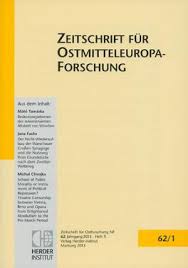Volksdeutsche in Tschenstochau. Nationalsozialistische Germanisierungspolitik für Täter, Profiteure und Zuschauer des Holocaust
"Volksdeutsche" in Czestochowa. National Socialist Germanisation policy for wrongdoers, profiteers and bystanders of the Holocaust
Author(s): Stephan LehnstaedtSubject(s): Jewish studies, Political history, WW II and following years (1940 - 1949), Fascism, Nazism and WW II, History of the Holocaust
Published by: Verlag Herder-Institut
Keywords: "Volksdeutsche"; Czestochowa; National Socialist Germanisation policy; wrongdoers; profiteers; bystanders of the Holocaust;
Summary/Abstract: The example of Czestochowa's "Volksdeutsche" shows how this section of the population witnessed the disfranchisement, persecution and murder of their Polish and Jewish neighbours and, simultaneously, took advantage from these crimes. The National Socialists wooed the "Volksdeutsche" and subsidized them well beyond the Standards within the Reich. At the same time, their material well-being had to be secured, which could only be attained through the economic exploitation and elimination of the remaining population: The so-called "Volkstum" policy, accordingly, was directly related to local measures against Jews. The "Volksdeutsche", however, were more than just passive bystanders, since even belonging to the list of "Volksdeutsche" demanded an active commitment to the National Socialist occupying forces. However, this commitment often was motivated by economic reasons rather than by national-socialist conviction. Additionally, many "Volksdeutsche" participated in crimes against Jews and Poles as members of the "Volksdeutsche Selbstschutz", SS and police units or as employees of the administration; others were employed or promoted in companies and thus benefited from the dispossession and killing of their former Jewish owners or employees. On the other hand, Nazi administrators profited from their precise knowledge of local conditions and the Polish language. On the whole, there was a closer relation between economic considerations and loyalty to the regime in the occupied territories than in the core territories of the Reich. Nevertheless, the contribution of the "Volksdeutsche" is probably best characterized as active complicity, since they could not exert greater influence on the local occupation policy. In general, the National Socialist "Volkstum" policy was ambivalent. Only few "Volksdeutsche" actually fulfilled the racial requirements postulated by the regime. As objects of a systematic Germanization policy, they were nevertheless not fully accepted by the occupiers, who considered them as profiteers and opportunists. The intended Integration into the "Volksgemeinschaft" failed in Cz^stochowa, most "Volksdeutsche" remained a kind of second class Germans.
Journal: Zeitschrift für Ostmitteleuropa-Forschung
- Issue Year: 57/2008
- Issue No: 4
- Page Range: 425-452
- Page Count: 28
- Language: German

